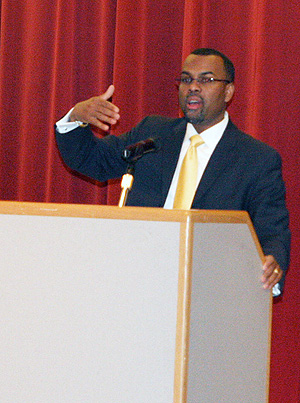To "Reflect on the legacy of Malcolm X in a post-heroic era" was the aim of Dr. Eddie S. Glaude, Jr., the William S. Tod Professor of Religion and African American Studies at Princeton Univeristy, in Thursday night's lecture at the Korb Classroom.
 Glaude, a native of Mississippi, received degrees from Morehouse College as well as Princeton University. He began the evening's lecture on Malcolm X by speaking on what the man represents in modern culture. "We encounter in the narrative of Alex Haley's The Autobiography of Malcolm X a figure of heroic stature," he said. "Malcolm X is a paradigm of present day African American culture."
Glaude, a native of Mississippi, received degrees from Morehouse College as well as Princeton University. He began the evening's lecture on Malcolm X by speaking on what the man represents in modern culture. "We encounter in the narrative of Alex Haley's The Autobiography of Malcolm X a figure of heroic stature," he said. "Malcolm X is a paradigm of present day African American culture."
Malcolm X was shaped as a heroic character, Glaude said, in two major ways. "The first way Malcolm is shaped as exemplary or as a hero is in his spiritual journey," he said. Glaude then drew parallels between Malcolm X's spiritual maturation with that of St. Augustine's, citing the similarities in the debauchery in each of their youths, respectively. Malcolm X went through two major conversions, Glaude stated, first to the Islamic sect of The Nation of Islam, and later in life to another Islamic sect, becoming a Sunni Muslim. "The spiritual life of Malcolm X cannot be digested without the second conversion" Glaude said.
Glaude next moved to the second view of Malcolm X as a hero. His story bears much in common with the up-from-slavery format. Malcolm X has been "cast as both a religious exemplar and a secular prophet" Glaude said. He has been claimed by religious groups and by secular groups alike, and is the standard-bearer of the portion of African American culture which still attempts to, as Glaude put it, "negotiate with" an inner rage.
It next became necessary, Glaude felt, to consider just what connotations are born out of being a hero. He examined heroes in terms of how we remember them, and stated that "Memory is fraught with ethical significance, because memories orient us to the present. Heroes preserve the memory of culture, and orient us to the future." It must, however, be kept in mind, Glaude warned, that "Exemplars both inspire, and potentially enslave. We should not let memories obstruct our efforts in thinking of the here and now."
Glaude also expounded upon the term 'post-racial,' which is often ascribed to contemporary culture. "It is," he said, "a lazy term through which America seeks to get shut of blackness. It stands between a dying age and an emerging one." Post-heroic, a key phrase in the topic of the lecture, itself received a good deal of thorough, detailed thought from Glaude. He answered questions such as 'what does it mean to live in a post-heroic era?' and 'how do we find or become heroes ourselves?'
 "We see ourselves as born in the shadows of heroes, and we have nostalgia for heroic times—we need heroes again" he said. "We must find and witness heroic characteristics worthy of our own age. Heroism is not an inherent quality, but quite often is an extraordinary act done by an ordinary man. Perhaps now we are released from the narcissistic hole of heroes, and we can look for these heroic characteristics within ourselves."
"We see ourselves as born in the shadows of heroes, and we have nostalgia for heroic times—we need heroes again" he said. "We must find and witness heroic characteristics worthy of our own age. Heroism is not an inherent quality, but quite often is an extraordinary act done by an ordinary man. Perhaps now we are released from the narcissistic hole of heroes, and we can look for these heroic characteristics within ourselves."
Wabash Junior Sam Prellwitz was enthusiastic about Glaude's in-depth consideration of each aspect of heroism, and how the nation as a whole can attempt to give the word 'hero' an egalitarian spin. "The speaker exemplified a thorough understanding of the implications of previous heroes and heroines" he said. "The need for a more thorough dispersion of the quality which is in the hero really shined through and made an impression on me."
Sophomore Josh Johnson, a member of the Malcolm X Institute, reflected on the need for the campus to embrace Glaude's message, and for its apparent lack in doing so thus far as regards minorities. "The lecture was great, we got to engage in conversation with a brilliant minority intellectual" he said
Author of a number of books, including his latest, In a Shade of Blue: Pragmatism and the Politics of Black America, Glaude was brought to Wabash's campus by the men of the Malcolm X Institute for Black Studies.
Photos by Alex Moseman '11